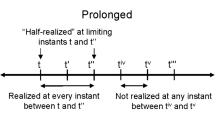Abstract
Treating instants of time as primitive not only is conceptually implausible but also has encountered grave practical difficulties. A satisfactory theory of time seems to be one which is based on the common-sense idea that events or periods are the primitive enties of time while instants are constructed from them. In this paper we present one such common-sense theory of time. We start from a structure of events, construct instants out of the events, and then show that these instants have the properties we normally expect of them. Views discussed here include the view of Allen and Hayes, and that of Russell.
Preview
Unable to display preview. Download preview PDF.
Similar content being viewed by others
References
J. F. Allen. Maintaining knowledge about temporal intervals. Communications of the ACM, 26(11):832–834, 1983.
J. F. Allen. Towards a general theory of actions and time. Artificial Intelligence, 23:123–154, 1984.
J. F. Allen and P. J. Hayes. A common-sense theory of time. In Proceedings of the Ninth International Joint Conference on Artificial Intelligence, pages 528–531, 1985.
J. F. Allen and P. J. Hayes. Moments and points in an interval-based temporal logic. Computational Intelligence, 5:225–238, 1989.
E. Bach. On time, tense, and aspect: an essay in english metaphysics. In P. Cole, editor, Radical Pragmatics, pages 63–81. Academic Press, New York, 1981.
M. Bennett and B. Partee. Towards the Logic of Tense and Aspect in English. System Development Corporation, Santa Monica, California, 1972. (Available from the Indiana University Linguistics Club).
D. Dowty. Word Meaning and Montague Grammar. Reidel, Dordrecht, 1979.
M. P. Georgeff and A. L. Lansky, editors. Reasoning about Actions and Plans. Morgan Kaufann Publishers, California, 1987.
C. L. Hamblin. Instants and intervals. In J. T. Fraser, editor, The Study of Time, pages 325–331. Springer-Verlag, New York, 1972.
P. J. Hayes and F. J. Allen. Short time periods. In Proceedings of the Tenth International Joint Conference on Artificial Intelligence, pages 981–983, 1987.
J. Hobbs. Granularity. In Proceedings of IJCAI-85, pages 432–435, 1985.
J. A. W. Kamp. Events, instants and temporal reference. In A. von Stechow, editor, Semantics from different points of view, pages 378–417. Springer-Verlag, 1979.
J. A. W. Kamp. Some remarks on the logic of change, part 1. In Time, Tense and Quantifiers, Proceedings of Stuttgart Conference on the Logic of Tense and Quantification, pages 135–179. North Holland, 1980.
Y. Q. Lin. Two theories of time. Journal of Applied Non-Classical Logics, 1(1):37–63, 1991.
Y. Q. Lin. Theories of Time for Linguistics and Artificial Intelligence. PhD thesis, University of Essex, 1992.
D McDermott. A temporal logic for reasoning about processes and plans. Cognitive Science, 6:101–155, 1982.
J. M. E. McTaggart. Time. In M. Gale, editor, The Philosophy of Time. MacMillan, London, 1968.
R. Montague. Pragmatics and intensional logic. In R. Thomason, editor, Formal Philosophy. Yale University Press, New Haven, 1974.
A. P. D. Mourelatos. Events, process, and states. Linguistics and Philosophy, 2:415–434, 1978.
I. Newton. Mathematical Principles of Natural Philosophy. University of California Press, Berkeley, 1934. (F. Cajori, editor).
W. H. Newton-Smith. The Structure of Time. Routledge and Hegan Paul, London, 1980.
T. Parsons. The progressive in english: events, states and processes. Linguistics and Philosophy, 12:213–241, 1989.
A. N. Prior. Past, Present and Future. Oxford University Press, 1967.
B. Russell. Our Knowledge of the External World: as a Field for Scientific Method in Philosophy (Revised Edition). The Open Court Publishing Company, London, 1926.
B. Russell. On order in time. In R. C. Marsh, editor, Russell, B: Logic and Knowledge(essays 1901–1950). London, London, 1956.
Y. Shoham. Reasoning about Change. The MIT press, London, 1988.
E. P. K. Tsang. A partial world description approach to planning. PhD thesis, University of Essex, 1987.
E. P. K. Tsang. Time structures for artificial intelligence. In Proceedings of the Tenth International Joint Conference on Artificial Intelligence, pages 456–461, 1987.
R. Turner. Logics for Artificial Intelligence. Horwood, Chichester, 1984.
J. F. A. K. van Benthem. The Logic of Time. Reidel, London, 1983.
Z. Vendler. Linguistics in Philosophy. Cornell University Press, Ithaca and London, 1967.
A. G. Walker. Duées et instants. Rev. Scientifique, 85:131–134, 1947.
A. N. Whitehead. The Concept of Nature. Cambridge University Press, Cambridge, 1920.
J. Whitrow. The Natural Philosophy of Time. Thames and Huston, London, 1961.
Author information
Authors and Affiliations
Editor information
Rights and permissions
Copyright information
© 1994 Springer-Verlag Berlin Heidelberg
About this chapter
Cite this chapter
Lin, Y.Q. (1994). A common-sense theory of time. In: Lakemeyer, G., Nebel, B. (eds) Foundations of Knowledge Representation and Reasoning. Lecture Notes in Computer Science, vol 810. Springer, Berlin, Heidelberg. https://doi.org/10.1007/3-540-58107-3_13
Download citation
DOI: https://doi.org/10.1007/3-540-58107-3_13
Published:
Publisher Name: Springer, Berlin, Heidelberg
Print ISBN: 978-3-540-58107-9
Online ISBN: 978-3-540-48453-0
eBook Packages: Springer Book Archive




